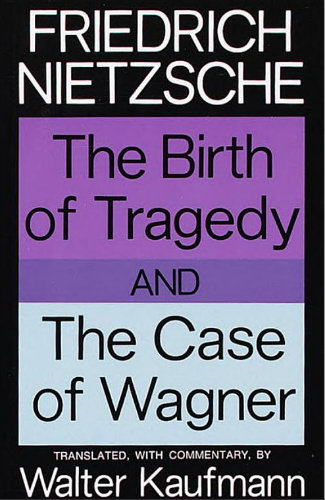Die Geburt der Tragödie, Oder: Griechenthum und Pessimismus, 3rd ed., 1886. Recommended translations:
- The Birth of Tragedy and The Case of Wagner, trans. Walter Kaufmann, Random House, 1967.
- The Birth of Tragedy & The Genealogy of Morals, trans. Francis Golffing, Doubleday, 1956.
Excerpt:
Whatever may be at the bottom of this questionable book, it must have been an exceptionally significant and fascinating question, and deeply personal at that: the time in which it was written, in spite of which it was written, bears witness to that—the exciting time of the Franco-Prussian war of 1870-71. As the thunder of the Battle of Wörth was rolling over Europe, the muser and riddle-friend who was to be the father of this book sat somewhere in an alpine nook, very bemused and beriddled, hence very concerned and yet unconcerned, and wrote down his thoughts about the Greeks—the core of the strange and almost inaccessible book to which this belated preface (or postscript) shall now be added. A few weeks later—and he himself was to be found under the walls of Metz, still wedded to the question marks that he had placed after the alleged “cheerfulness” of the Greeks and of Greek art. Eventually, in that month of profoundest suspense when the peace treaty was being debated at Versailles, he, too, made peace with himself and, slowly convalescing from an illness contracted at the front, completed the final draft of “The Birth of Tragedy Out of the Spirit of Music.”—Out of music? Music and tragedy? Greeks and the music of tragedy? Greeks and the art form of pessimism? The best turned out, most beautiful, most envied type of humanity to date, those most apt to seduce us to life, the Greeks—how now? They of all people should of needed tragedy? Even more—art? For what—Greek art?
Online:
Barnes & Noble (Recommended Translation: Kaufmann)
Amazon (Recommended Translation: Golffing)
Nietzsche Source (German, Free Access)
